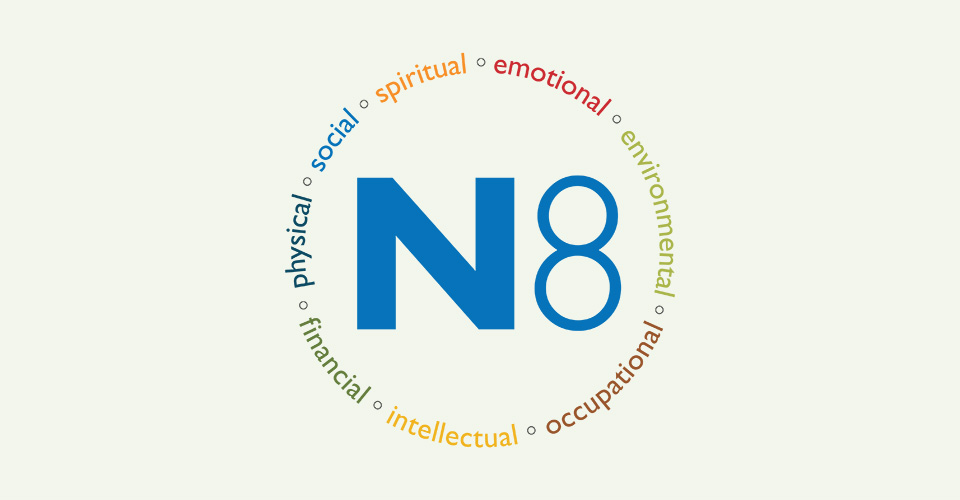 Leslie Gonzalez and Bethany Bair, second-year students in the College of Medicine, contributed the following article as one of the educational initiatives sponsored by the NEOMED’s Student Wellness Committee as part of their peer-support series on the eight dimensions of wellness. The eight dimensions that this student and staff committee supports include: emotional, environmental, financial, intellectual, occupational, physical, social and spiritual wellness. The concept of eight dimensions of wellness comes from the Substance Abuse and Mental Health Services Administration (SAMHSA), a U.S. government agency.
Leslie Gonzalez and Bethany Bair, second-year students in the College of Medicine, contributed the following article as one of the educational initiatives sponsored by the NEOMED’s Student Wellness Committee as part of their peer-support series on the eight dimensions of wellness. The eight dimensions that this student and staff committee supports include: emotional, environmental, financial, intellectual, occupational, physical, social and spiritual wellness. The concept of eight dimensions of wellness comes from the Substance Abuse and Mental Health Services Administration (SAMHSA), a U.S. government agency.
Leslie writes:
We hear the term imposter syndrome a lot, and as medical students many of us feel it, but what is it? Imposter syndrome describes the phenomenon of feeling as if you do not belong or aren’t good enough to be where you are or have what you’ve earned. It’s a concept that has been described in the psychology literature since the 1970s and is common among graduate students, including medical students.
I spoke with second-year medicine student Bethany Bair regarding this phenomenon, as her experience has given her great insight into the matter. Bethany worked as a Licensed Professional Clinical Counselor for eight years before starting at NEOMED in 2022.
LG: How would you describe the experience of imposter syndrome? Who gets it, and what may have contributed to these feelings?
BB: People who experience imposter syndrome often have trouble internalizing and accepting their successes. They tend to think that their success is due to luck rather than their skills or abilities. Often there is a history of having grown up in a family that focused heavily on achievement. Imposter syndrome may be exacerbated in students who are minorities among their peer group. Moreover, there are often fears of being “found out” and thoughts that “I’m the only one” who doesn’t belong here. Unfortunately, keeping these feelings private can often make them worse.
LG: What are some problems that come with imposter syndrome?
BB: So, one of the problems that comes with imposter syndrome is the idea of comparison. Comparing oneself to other people can temporarily raise or lower our self-esteem, depending on how we perceive the people we are comparing ourselves to. We tend to compare ourselves “up,” meaning that we compare ourselves to people we believe are higher-performing, smarter or “fit in” in some way more than we think we do. Studies show that comparison thoughts can be up to 10% of our thoughts. Comparison thoughts can be transient, meaning that they come and go and don’t really cause problems, but they can become problematic when they are chronic or are something we are engaging in often – this can heavily impact self-esteem.
LG: Can comparison be helpful?
BB: Comparison can be helpful if it is related to enhancing specific skills or learning helpful strategies; however, more often comparison is detrimental or even debilitating. This can also lead to exacerbation of depression, anxiety or isolation.
LG: What other problems come with imposter syndrome?
BB: Imposter syndrome can also manifest as perfectionism. In an effort to feel okay with oneself, one may assume they have to be “perfect” and that there is no room for errors or mistakes. In medical school, some ways perfectionism shows up include procrastinating or over-preparing. These issues can become a downward spiral: we don’t think we are good enough, we push ourselves harder, we put even more pressure on ourselves, we can develop increasing anxiety and depression, and this can result in poorer performance and start the cycle all over again. In the instances when performance stays high, there is added pressure to maintain the standard that has been set.
LG: What can students do to avoid or address imposter syndrome in themselves?
BB: So, there are a few things we can do to work on imposter syndrome.
- You may need to first acknowledge that this is a problem that you are having, and you can decide to share this with a trusted peer or mentor.
- Next, work on developing an internal locus of control. This means taking a personal inventory and acknowledging that you have gotten to where you are because of your own work – not because of chance or luck.
- Work towards developing a healthy self -esteem. Develop an accurate perspective of your own strengths and weaknesses. Also, build your sense of self-worth independent of your accomplishments.
- Work on changing your thinking to allow room for mistakes. Mistakes are learning opportunities.
- Finally, consider talking with a counselor if what you are going through is causing you significant distress, if this is something you struggled with for a long time, or if it just doesn’t seem to improve.
Remember, you are never alone. Your peers are experiencing the same challenges you are and can be a vital resource during this strenuous period of your life. You can also always reach out to your primary health care provider, NEOMED’s counseling services, or other local and virtual providers.
